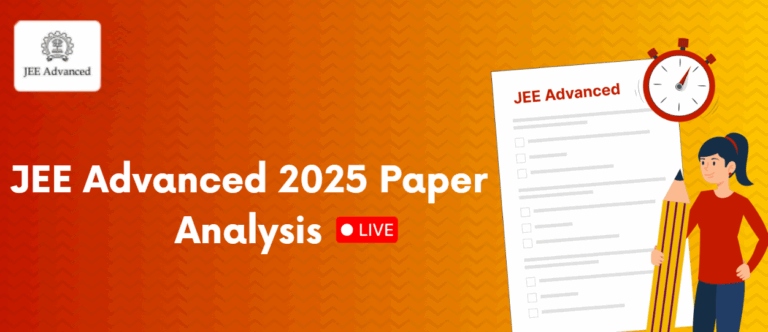Summarise With AI

The Joint Entrance Examination (JEE) Advanced is the second examination after JEE Mains. Many Lakhs of students appear for the exam making it one of the most competitive entrance exams in India for entrance into undergraduate courses. Although the exam requires dedicated efforts and hard work, it also requires smart work in order to excel in the exam and secure admission.
Revision and mock tests are an important source of the examination which should not be neglected. With regular mock tests and working or improving on the feedback from the mocks, students can easily crack the JEE Advanced exam. This blog will cover insights about analysing JEE Advanced mock tests effectively to increase your chances of success in the exam.
Why is the Test Series For JEE Advanced Important?
Before diving into the analysis of mock tests, it’s essential to understand their importance. They help identify weak areas in subjects like Physics, Chemistry, and Mathematics and improve speed and accuracy through regular practice. Analysing your performance boosts confidence as you notice improvements. Moreover, mock tests familiarise you with the JEE Advanced exam pattern, question types, and difficulty level, ensuring you’re better prepared for the exam. Regular analysis is key to refining strategies and increasing your chances of success.
Tips to Effectively Analyze JEE Advanced Mock Tests
Attempting mock tests isn’t enough to ace the JEE Advanced exam. Students need to analyse their performance, and here are some steps that students can follow:
1. Review the Overall Performance
Scores at the end of the Mock test predict your JEE Percentile based on your performance in the exam. However, rather than looking at your scores, look deeper into the details in the following manner:
- Analyse each subject: Analyze how you’ve performed on each subject. If you are consistently scoring low in one subject, it is a sign that you need to allocate more time and effort to that subject.
- Time Taken: Identify the type of questions where you have spent most of the time and start practising questions that are sought.
- Accuracy vs Attempted Questions: A high number of attempted questions with low accuracy suggests a need for better problem-solving or understanding of concepts. Compare the number of questions you have attempted with the accuracy and focus on improving.
2. Analyze Each Subject and Section
Shift your focus to analyse your performance in each section of each subject:
- Physics: Physics requires a blend of conceptual clarity and application of principles, focus on essential topics like mechanics and electrodynamics, and evaluate your conceptual understanding. Revise the topics where you made mistakes and work on problem-solving.
Check the Important Topics for Physics Here: Click Here
- Chemistry: Organic chemistry, physical chemistry, and inorganic chemistry are three branches, and people might often find it challenging to find one branch of chemistry. Allocate more time to the areas where you lack.
Check the Important Topics for Chemistry Here: Click Here
- Mathematics: Mathematics in JEE Advanced can be challenging and requires both conceptual understanding and practice. Look at the topics that are consuming your time or causing errors and practice them regularly
Check the Important Topics for Mathematics Here: Click Here
3. Identify the Types of Mistakes
Analysing your mistakes will help you understand why you are making the mistakes and prevent you from making the same mistakes again. Here are the types of mistakes students often commit while solving mocks:
- Conceptual Mistakes: Conceptual Mistakes occur if a candidate lacks the understanding of concepts or theories. Conceptual mistakes can be minimised by gaining a strong foundation in the concepts and with regular revision.
- Calculation Mistakes: Calculation mistakes are one of the key factors that can reduce your score in the JEE Advanced exam. Practising mental math and practising some problem-solving techniques can help students tackle these mistakes.
- Misinterpreting the Question: Sometimes, students misread the question, leading to incorrect answers. To minimise such mistakes, practice reading the questions carefully, focusing on keywords, and understanding what’s being asked before solving.
4. Learn from Correct Questions
Focusing on the correct answers and analysing why you have answered them correctly will help you reinforce your strength and boost your confidence. Analysing the correct answers enables you to understand what works well for you.
5. Identify Weak Areas
After identifying the weak areas, it is essential to curate a proper plan to ensure that you don’t repeat the same mistakes again in the exam.
- Revisit Key Concepts: Revise your notes or reference material until you feel confident on the topics where you require extra effort.
- Practice more problems: Problem solving is at the forefront of the exam and you require constant efforts and practice to solve complex problems easily.
6. Focus on Time Management
While analysing your mock tests, evaluate the type of questions that are taking more time and practice them multiple times to reduce the time taken to solve the problem. Follow these tips while trying to save time in the exam:
- Focus on your strong zone and avoid attempting weak areas.
- Don’t spend too much time on one subject.
7. Track your Progress
Compare your scores, accuracy, and performance in specific subjects and track your performance over time. Consistent tracking will help you see your growth, identify weak areas, and refine your preparation strategy.
Conclusion
Mock test analysis is a vital part of preparing for JEE Advanced. By reviewing your performance in detail and understanding the mistakes and successes, you can optimise your study plan and improve your chances of success. Remember that taking mock tests is not just about evaluating your performance. It’s about identifying areas for improvement and continuously refining your approach.
Also Read : How to Challenge Answer Key for JEE Advanced
Frequently Asked Questions
1. What is a good rank in JEE Advanced?
A rank below 5000 is considered good in JEE Advanced.
2. Which IIT is conducting JEE Advanced 2025?
IIT Kanpur is responsible for conducting JEE Advanced 2025.
3. Which year’s JEE advance was tougher?
JEE Advanced in the year 2016 was considered tough by the experts.
4. Which IIT is responsible for conducting JEE for 2026?
IIT Roorkee is responsible for conducting JEE for 2026.
5. What is the registration date for JEE Mains session 2?
JEE Mains registrations for session 2 commenced on February 1st, and the last date to register for the exam is on February 25th 2025.







